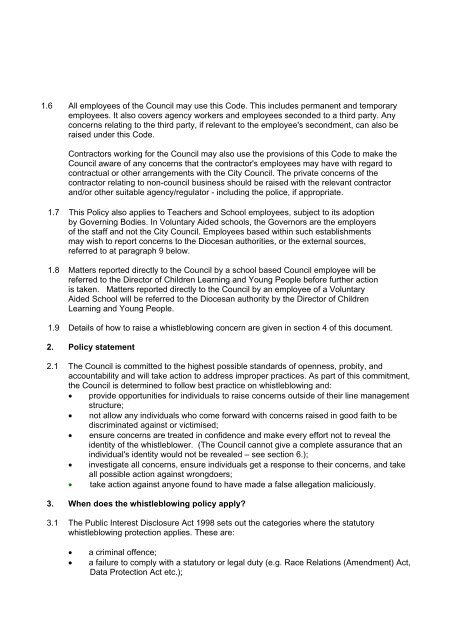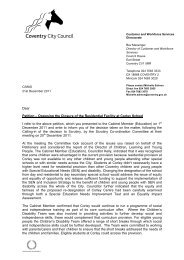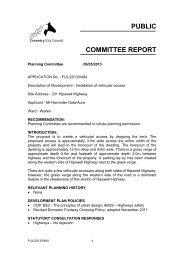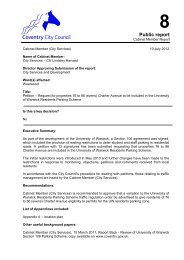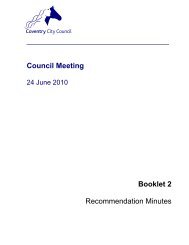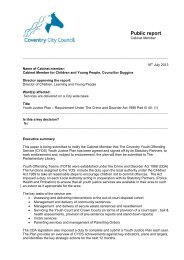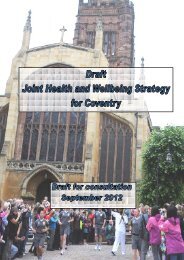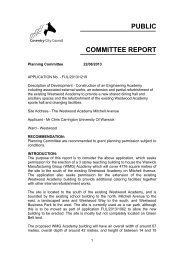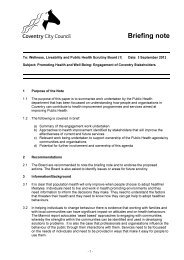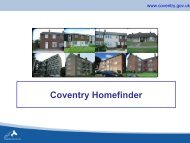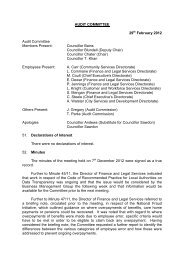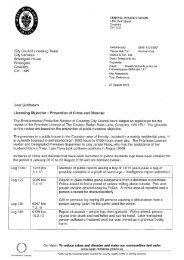Whistleblowing Policy - Coventry City Council
Whistleblowing Policy - Coventry City Council
Whistleblowing Policy - Coventry City Council
Create successful ePaper yourself
Turn your PDF publications into a flip-book with our unique Google optimized e-Paper software.
1.6 All employees of the <strong>Council</strong> may use this Code. This includes permanent and temporary<br />
employees. It also covers agency workers and employees seconded to a third party. Any<br />
concerns relating to the third party, if relevant to the employee's secondment, can also be<br />
raised under this Code.<br />
Contractors working for the <strong>Council</strong> may also use the provisions of this Code to make the<br />
<strong>Council</strong> aware of any concerns that the contractor's employees may have with regard to<br />
contractual or other arrangements with the <strong>City</strong> <strong>Council</strong>. The private concerns of the<br />
contractor relating to non-council business should be raised with the relevant contractor<br />
and/or other suitable agency/regulator - including the police, if appropriate.<br />
1.7 This <strong>Policy</strong> also applies to Teachers and School employees, subject to its adoption<br />
by Governing Bodies. In Voluntary Aided schools, the Governors are the employers<br />
of the staff and not the <strong>City</strong> <strong>Council</strong>. Employees based within such establishments<br />
may wish to report concerns to the Diocesan authorities, or the external sources,<br />
referred to at paragraph 9 below.<br />
1.8 Matters reported directly to the <strong>Council</strong> by a school based <strong>Council</strong> employee will be<br />
referred to the Director of Children Learning and Young People before further action<br />
is taken. Matters reported directly to the <strong>Council</strong> by an employee of a Voluntary<br />
Aided School will be referred to the Diocesan authority by the Director of Children<br />
Learning and Young People.<br />
1.9 Details of how to raise a whistleblowing concern are given in section 4 of this document.<br />
2. <strong>Policy</strong> statement<br />
2.1 The <strong>Council</strong> is committed to the highest possible standards of openness, probity, and<br />
accountability and will take action to address improper practices. As part of this commitment,<br />
the <strong>Council</strong> is determined to follow best practice on whistleblowing and:<br />
• provide opportunities for individuals to raise concerns outside of their line management<br />
structure;<br />
• not allow any individuals who come forward with concerns raised in good faith to be<br />
discriminated against or victimised;<br />
• ensure concerns are treated in confidence and make every effort not to reveal the<br />
identity of the whistleblower. (The <strong>Council</strong> cannot give a complete assurance that an<br />
individual's identity would not be revealed – see section 6.);<br />
• investigate all concerns, ensure individuals get a response to their concerns, and take<br />
all possible action against wrongdoers;<br />
• take action against anyone found to have made a false allegation maliciously.<br />
3. When does the whistleblowing policy apply?<br />
3.1 The Public Interest Disclosure Act 1998 sets out the categories where the statutory<br />
whistleblowing protection applies. These are:<br />
• a criminal offence;<br />
• a failure to comply with a statutory or legal duty (e.g. Race Relations (Amendment) Act,<br />
Data Protection Act etc.);


